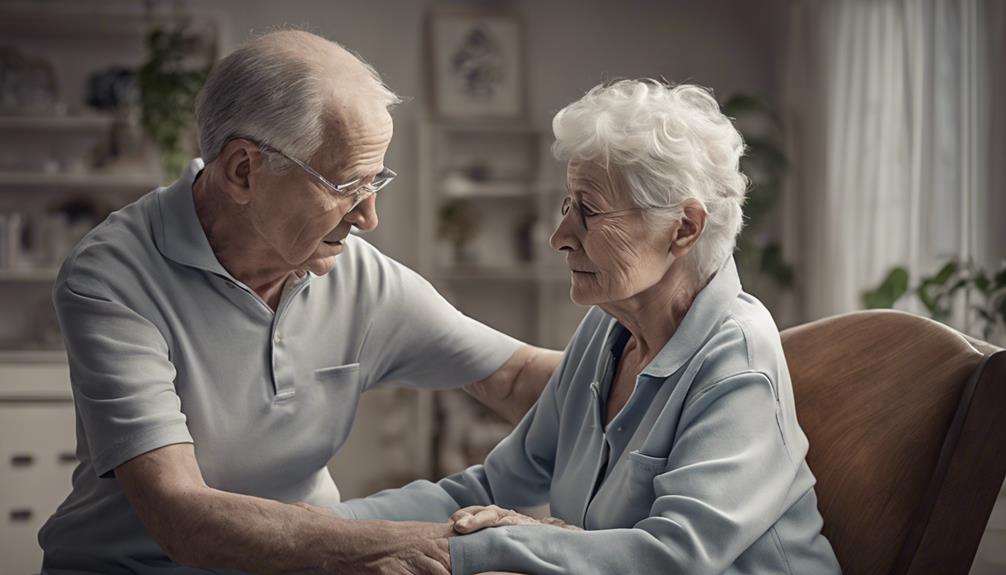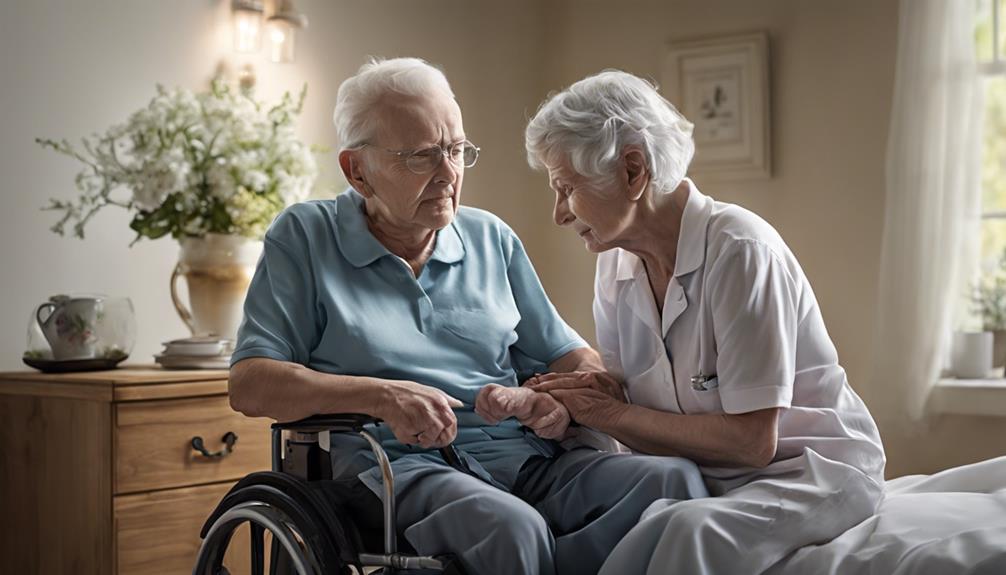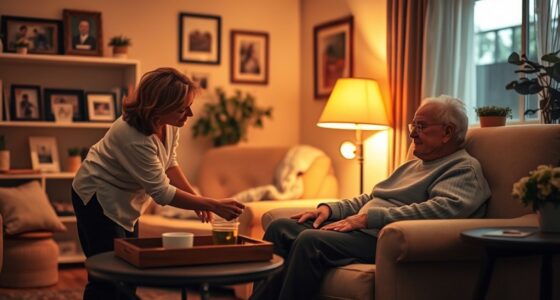Managing aggression in the various stages of dementia can be compared to walking a tightrope amidst a storm – it necessitates equilibrium, concentration, and resilience.
Understanding the nuances of behavior changes and triggers is key to effective intervention. As you embark on this journey, exploring tailored approaches and innovative strategies can lead to better outcomes.
Stay tuned to discover how proactive measures and compassionate care can make a significant difference in enhancing the well-being of individuals with dementia experiencing aggression.
Key Takeaways
- Understanding triggers like pain and confusion helps manage aggression effectively.
- Employ de-escalation techniques such as calming communication and activities.
- Utilize clear and empathetic communication strategies to address underlying emotions.
- Prioritize safety measures and seek professional help for tailored interventions.
Understanding Aggression Triggers
Understanding the triggers of aggression in individuals with dementia is crucial for effectively managing their behavior and promoting a calm and safe environment. Aggression in dementia can be sparked by various factors such as pain, fear, confusion, or sensory overload. Imagine feeling constant pain or fear but being unable to communicate it clearly, leading to frustration and potential aggression.
Changes in routine or environment can also disrupt a sense of familiarity, causing distress and aggressive reactions. Unmet needs, whether physical or emotional, can manifest as challenging behaviors. Environmental elements like loud noises, clutter, or overstimulation can overwhelm the senses, contributing to heightened agitation.
De-escalation Techniques

When faced with aggression in individuals with dementia, employing calming communication techniques can help diffuse the situation effectively. To de-escalate aggressive behavior in dementia patients, it's crucial to use a calm and reassuring tone. This approach can help minimize distractions and maintain a safe distance, creating a conducive environment for effective communication.
Clear and slow communication is essential to address the underlying emotions triggering the aggression. Engaging the individual in calming activities such as listening to music or gentle exercise can also aid in reducing aggression levels. Providing space and time for the person with dementia to calm down before further intervention is crucial.
Communication Strategies
To effectively communicate with individuals exhibiting aggression in dementia stages, employing simple and clear language is paramount for fostering understanding and cooperation. Maintaining a calming tone and showing empathy through non-verbal cues can significantly impact the outcome of your interactions. Here are four key strategies to enhance communication during challenging moments:
- Speak Clearly: Using simple language and avoiding complex sentences can help the individual better comprehend your message, reducing confusion and frustration.
- Offer Choices: Providing options empowers the person and gives them a sense of control, which can lessen feelings of agitation and resistance.
- Use Positive Reinforcement: Acknowledge positive behaviors and efforts to redirect attention towards constructive interactions, reinforcing cooperation.
- Employ Non-Verbal Cues: Gestures, touch, and maintaining eye contact can convey support and understanding, fostering a connection beyond words.
Safety Measures

For enhanced safety when managing aggression in dementia stages, prioritize maintaining a secure environment and protecting yourself during confrontational situations. It's crucial to implement safety measures to ensure the well-being of both the individual with dementia and yourself. Here are some practical strategies to help you navigate through aggressive episodes and create a safer environment:
| Safety Measures | Details |
|---|---|
| Protect Yourself | Maintain a safe distance and be mindful of potential harm during confrontations. |
| Prevent Self-Harm | Remove any objects that could be used for harm and ensure a hazard-free environment. |
| Calming Techniques | Use gentle reassurance, soft tones, and soothing gestures to de-escalate behavior. |
| Seek Support Services | Consider reaching out to healthcare professionals or support services for guidance. |
Seeking Professional Help
Consider consulting with a healthcare provider or a specialist in geriatric psychiatry for professional help in managing aggression associated with dementia stages. Seeking assistance from a behavioral therapist or counselor experienced in dementia care can provide tailored strategies for aggression management. A comprehensive evaluation by a healthcare professional can help identify underlying causes of aggression and develop a personalized treatment plan. In some cases, medication prescribed by a healthcare provider may be necessary to help manage aggression in individuals with dementia.
Here are four reasons why seeking professional help is crucial:
- Personalized Care: Professionals can tailor interventions to the individual's unique needs, enhancing the quality of care for the person with Alzheimer's.
- Safety: Expert guidance can ensure the safety of both the person with dementia and their caregivers, reducing the risk of harm from aggressive behaviors.
- Specialized Knowledge: Professionals specializing in geriatric psychiatry possess the expertise to address complex behavioral symptoms associated with dementia effectively.
- Emotional Support: Professional help not only benefits the person with dementia but also provides emotional support and guidance for caregivers facing challenging situations.
Frequently Asked Questions
How Do You Manage Aggressive Behavior in Dementia?
When dealing with aggression in dementia, you can manage it by:
- Identifying triggers
- Implementing calming techniques
- Communicating calmly
Focus on creating a safe environment by:
- Removing hazards
- Maintaining routines
Seek help from healthcare providers for a personalized management plan. By addressing underlying causes and using de-escalation strategies, you can effectively manage aggressive behavior in dementia.
What Stage of Dementia Is Aggression?
Aggression can occur at any stage of dementia, impacting individuals and caregivers.
It's essential to recognize that aggression isn't limited to a specific phase of dementia; it can manifest unpredictably.
Understanding this can help you prepare for potential challenges and respond with patience and empathy.
How Do You Calm Down an Angry Dementia Patient?
When you're trying to calm down an angry dementia patient, remember to stay calm yourself. Use gentle touch, soothing music, or redirection to shift their focus.
Speak in a reassuring tone and offer space for them to relax. Avoid arguments or confrontation, and try to identify the root cause of their anger.
Where Do Aggressive Dementia Patients Go?
When aggressive dementia patients need specialized care, they may go to facilities with trained staff. Some may require psychiatric evaluation and treatment in mental health facilities, while severe cases might lead to hospitalization for safety reasons.
Programs and facilities focused on behavioral management can benefit these individuals. Caregivers seeking guidance from healthcare professionals on appropriate care settings can ensure the best support and safety for aggressive dementia patients.
Conclusion
In conclusion, managing aggression in different stages of dementia requires patience, understanding, and a tailored approach. By identifying triggers, using de-escalation techniques, and prioritizing safety, caregivers can help individuals with dementia navigate challenging behaviors.
Remember, in the journey of caring for someone with dementia, compassion is the key to unlocking a world of comfort and support. Just like a gentle breeze can calm the storm, your empathy and care can make a world of difference in their well-being.









